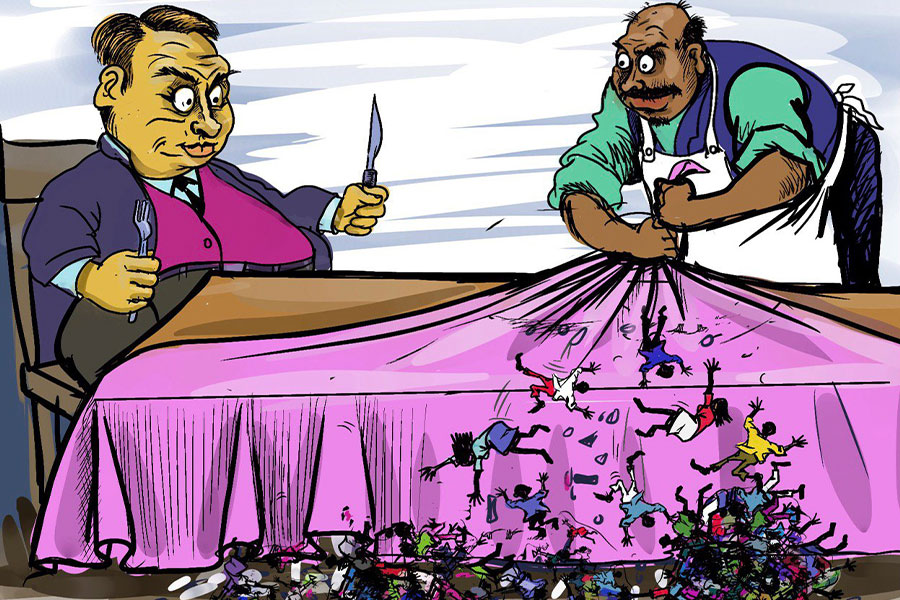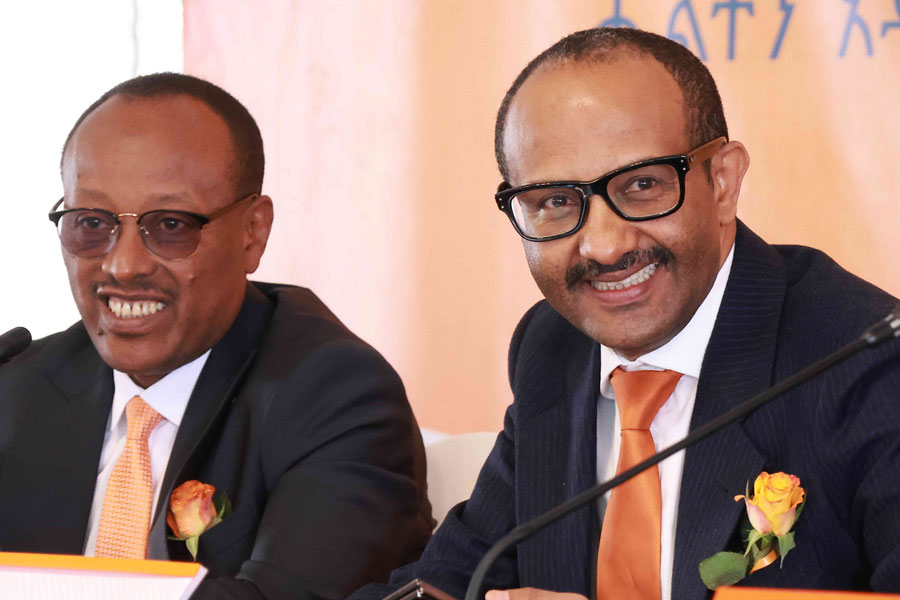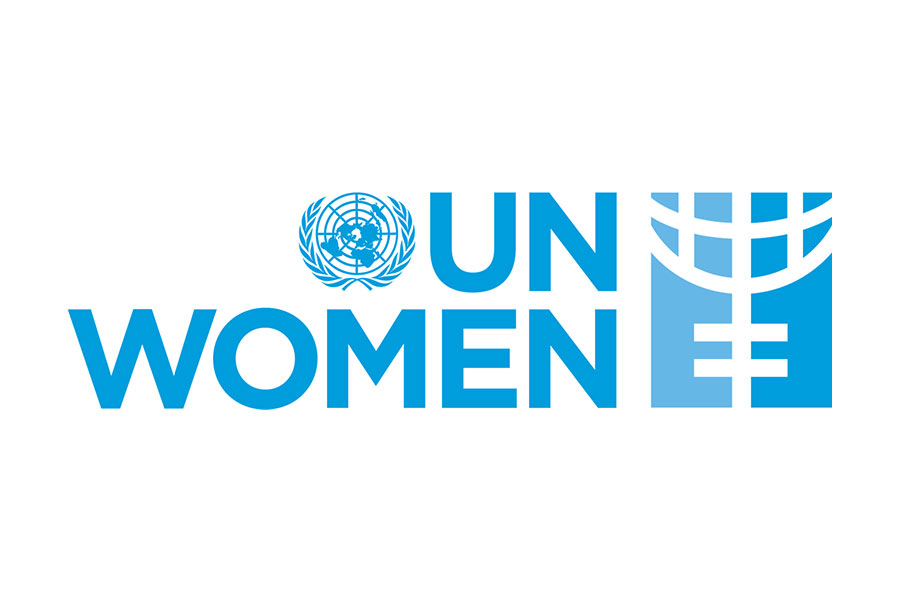
Fortune News | Jun 25,2022
Dec 23 , 2023
By Ousmane Dione , Girma Amente
A home to Africa's largest livestock population, Ethiopia can tap into an unexplored treasure: the livestock and fisheries sector. A visionary partnership between the World Bank and the federal government promises to transform this sector, accounting for nearly 20pc of the GDP. It can be a game-changer for the country's growth, write Ousmane Dione, World Bank's country director for Eritrea, Ethiopia, South Sudan and Sudan, and Girma Amente (PhD), minister of Agriculture.
Ethiopia’s livestock and fisheries sector holds immense economic growth and development potential. With the largest livestock population in Africa and ranking fifth in the world, the sector accounts for nearly 20pc of the country’s GDP. It employs a significant portion of the labour force.
Ethiopia has untapped opportunities in the fisheries and aquaculture sector. Recognising this potential, the World Bank and the federal government have partnered to develop the sector. The Livestock & Fisheries Sector Development Project (LFSDP), financed by the World Bank and implemented by the Ministry of Agriculture, aims to unlock the sector’s potential by promoting productivity and commercialisation in the dairy, poultry, fisheries, and small ruminant value chains.
Recently, we conducted a joint field visit to Hawassa in the Sidama Regional State to assess the implementation of the project. These joint missions hold great significance as they allow us to gain firsthand insights into the projects’ execution and understand their real-world implications. Our aim is to learn what is working, what is not, and what we can do better, to deliver bigger, faster and greater results for all Ethiopians.
One of the key strengths of the LFSDP is its focus on social inclusion. The project is creating income-generating opportunities for women and unemployed youth, empowering them to participate actively in the sector.
We had the pleasure of meeting Haven and Adanech, two inspiring women actively involved in the dairy business. Along with their partners, they manage ‘The Burkito Milk Processing Centre’, offering a wide range of high-quality dairy products such as fresh cheese, creamy yoghurt, rich butter, and other delectable dairy treats. Their business has not only generated a substantial income for themselves and their families but has also become a source of inspiration for other women in their community.
Haven and Adanech’s remarkable success story demonstrates the transformative power of initiatives like the LFSDP in empowering women. Programs like the LFSDP enable women to break barriers, overcome societal limitations, and achieve economic independence by providing them with the necessary resources, training, and support.
We also interacted with Yosef and his friends, a group of young university graduates who have ventured into the poultry and livestock sector. These young Ethiopians are not only creating employment opportunities for themselves but are also contributing to the country's overall economic growth. Their dedication and enthusiasm serve as evidence of the sector's potential to promote job creation and youth empowerment.
The project contributes to building human capital by improving family nutrition. It is enhancing the productivity and efficiency of the livestock and fisheries sector, which leads to increased availability and accessibility of nutritious food sources. This, in turn, improves the nutritional status of families and individuals, especially in rural areas where access to diverse and nutritious food can be limited. Improved nutrition directly impacts human capital as it enhances physical and cognitive development, leading to better health outcomes and improved productivity.
The LFSDP also ensures household food security by helping to increase the production and availability of food resources within communities. This reduces the reliance on external food sources and enhances the resilience of households in the face of food shortages or price fluctuations. When households have access to an adequate and stable food supply, it positively impacts their overall well-being and allows individuals to focus on other aspects of their lives, such as education and skill development.
Projects such as LFSDP could also be crucial in promoting peace and stability, especially in conflict-prone communities. By addressing youth unemployment, improving livelihoods, fostering social cohesion, and working in partnership with diverse stakeholders, the project contributes to long-term stability. By creating economic opportunities, reducing poverty and inequality, and bringing together different communities to promote cooperation and shared responsibility, LFSDP and similar initiatives pave the way for a peaceful and prosperous future for all Ethiopians.
While LFSDP has made significant strides, challenges still need to be overcome.
The limited adoption of improved practices, inadequate support services, and a limited marketing and processing facilities hinder the growth of these sectors. Certain steps must be taken to unlock the potential and optimise the impact of the project and the sectors. Diversifying activities is crucial to reduce dependence on a single activity of the sector and promote resilience.
Embracing new technologies and innovative practices will enhance productivity and efficiency. Establishing market linkages and improving value chains will ensure farmers and producers access profitable markets. These measures will not only help the project beneficiaries but also contribute to the overall growth and development of the livestock and fisheries sectors.
PUBLISHED ON
Dec 23,2023 [ VOL
24 , NO
1234]

Fortune News | Jun 25,2022

Commentaries | Dec 14,2019

Editorial | May 31,2025

Sunday with Eden | Oct 05,2024

Commentaries | Jun 14,2025

News Analysis | Jan 19,2024

Radar | Mar 18,2023

Sponsored Contents | Oct 25,2021

Radar | Apr 15,2023

Viewpoints | Oct 14,2023

Photo Gallery | 173559 Views | May 06,2019

Photo Gallery | 163780 Views | Apr 26,2019

Photo Gallery | 153783 Views | Oct 06,2021

My Opinion | 136533 Views | Aug 14,2021
Editorial | Oct 11,2025

Dec 22 , 2024 . By TIZITA SHEWAFERAW
Charged with transforming colossal state-owned enterprises into modern and competitiv...

Aug 18 , 2024 . By AKSAH ITALO
Although predictable Yonas Zerihun's job in the ride-hailing service is not immune to...

Jul 28 , 2024 . By TIZITA SHEWAFERAW
Unhabitual, perhaps too many, Samuel Gebreyohannes, 38, used to occasionally enjoy a couple of beers at breakfast. However, he recently swit...

Jul 13 , 2024 . By AKSAH ITALO
Investors who rely on tractors, trucks, and field vehicles for commuting, transporting commodities, and f...

Oct 11 , 2025
Ladislas Farago, a roving Associated Press (AP) correspondent, arrived in Ethiopia in...

Oct 4 , 2025
Eyob Tekalegn (PhD) had been in the Governor's chair for only weeks when, on Septembe...

Sep 27 , 2025
Four years into an experiment with “shock therapy” in education, the national moo...

Sep 20 , 2025
Getachew Reda's return to the national stage was always going to stir attention. Once...

Oct 12 , 2025
Tomato prices in Addis Abeba have surged to unprecedented levels, with retail stands charging between 85 Br and 140 Br a kilo, nearly triple...

Oct 12 , 2025 . By BEZAWIT HULUAGER
A sweeping change in the vehicle licensing system has tilted the scales in favour of electric vehicle (EV...

Oct 12 , 2025 . By NAHOM AYELE
A simmering dispute between the legal profession and the federal government is nearing a breaking point,...

Oct 12 , 2025 . By NAHOM AYELE
A violent storm that ripped through the flower belt of Bishoftu (Debreziet), 45Km east of the capital, in...